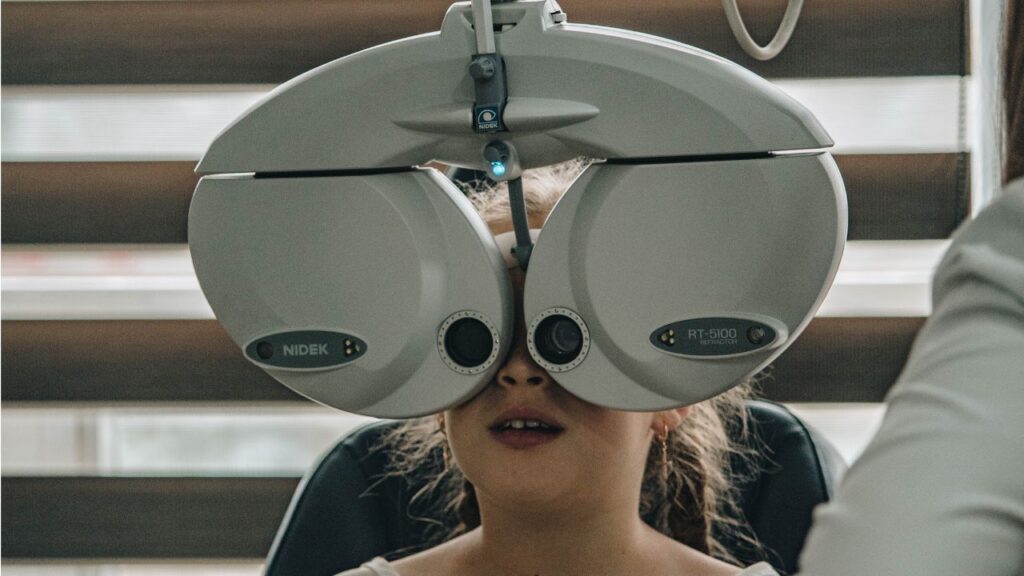Good health involves taking care of both your mind and body. Eating a healthy diet and exercising regularly are common habits, but what about your eyes? Our eyes play a crucial role in our lives as they allow us to see the world around us, appreciate its beauty, and capture memories. However, with the increasing use of technology and exposure to harmful environmental factors, our eyes are becoming more vulnerable to damage and disease.
In this blog, we will discuss the importance of Eye Health. From which types of doctors you can visit for an eye check, the importance to take eye health screenings regularly, what to expect during your doctor visit, and how you can prevent Eye Conditions starting from childhood to the years to come.
So, let’s take a look at it!
Types of Eye Doctor
Before you go for an eye health check, it is important to know that there are two main types of eye doctors: Ophthalmologists and Optometrists. These professionals may work together, but each has a different approach. According to WebMD, here’s what they do and the eye problems they treat:
Before you go for an eye health check, it is important to know that there are two main types of eye doctors: Ophthalmologists and Optometrists. These professionals may work together, but each has a different approach. According to WebMD, here’s what they do and the eye problems they treat:
Ophthalmologist
An Ophthalmologist specializes in diagnosing and treating eye diseases and disorders. They have completed medical school and a residency program in Ophthalmology.
Ophthalmologists are trained to perform complex eye surgeries and to manage a wide range of eye diseases, including:
- Cataracts
- Glaucoma
- Diabetic retinopathy
- Macular degeneration
- Other conditions that may lead to vision loss
and blindness or plastic surgery.
A doctor of Ophthalmology offers a complete range of eye care services. He or she can prescribe and fit eyeglasses and contact lenses, as well as provide routine eye care tests, such as comprehensive eye exams.
Optometrist
Optometrists, on the other hand, specialize in the examination and treatment of vision problems and eye diseases. They have completed a four-year doctoral program in optometry and perform comprehensive eye examinations to evaluate vision and identify any visual problems, such as nearsightedness, farsightedness, or astigmatism.
If you need a routine eye exam or if you have a vision problem, you may see an Optometrist. The major difference between these two eye care professionals is that Optometrists are not medical doctors and cannot perform complex eye surgery, but they play a crucial role in maintaining the health of your eyes and ensuring your visual acuity.
They often work in private practices, optical shops, or in teams with Ophthalmologists. They screen for eye diseases, such as cataracts or glaucoma, and can provide treatment for certain eye conditions, such as pink eye (conjunctivitis).
Get to know the basics of Eye conditions and diseases
Therefore, when starting your eye health journey, you may start with an optometrist for primary eye care. Then, if necessary, they can refer you to an ophthalmologist.
Why is it Important to visit an eye doctor regularly?
Waking up one day and being unable to see is a frightening thought. With the increasing use of screens and exposure to harmful environmental conditions, it is important to stay on top of eye health and educate yourself about eye health. There are several reasons why seeing an eye care professional regularly is important:
Early Detection of Diseases
Regular eye exams can help detect and prevent vision problems such as glaucoma, cataracts, and age-related macular degeneration at an early stage, when they can still be treated.
Prevent Blindness recommends eye exams every 2-4 years. And for people over 65 years old, every 1 or 2 years.
Prescription for Corrective Lenses
If you need glasses or contact lenses, an eye care professional can perform a comprehensive eye exam and provide you with the right prescription.
Monitoring of Chronic Health Conditions
Eye exams can also help monitor and manage chronic health conditions, such as diabetes, high blood pressure, and multiple sclerosis, as they can affect the eyes and vision.
Eye Care: keep your eyes healthy from childhood onward
The best way to practice eye health maintenance is by preventive care starting from kids until adulthood. Early detection is the key to better outcomes with any medical condition, and vision problems are no exception.
Performing regular eye exams helps identify and correct vision problems early when treatment is most effective. For children, the American Academy of Ophthalmology explains that the first eye exam should be done as soon as they are born, then the first comprehensive eye exam is recommended between 6 and 12 months of age, then again between 12 and 36 months, between 3 and 5 years of age and before starting school.
Thereafter, eye exams should be part of your routine health care at least once a year. In childhood, these exams are essential because:
- They help identify eye conditions such as amblyopia (“lazy eye”) or strabismus (“crossed eye”), which can be effectively treated if detected early.
- Improve school and sports performance by detecting and correcting vision problems that may be affecting a child’s learning performance and academic success.
- Detect underlying health problems, such as hypertension, diabetes, and certain neurological conditions, which may not have symptoms.
For adults with good vision, the AAO recommends complete eye exams should be taken once in their 20s, and twice in their 30s. From 40 years and over, when early signs of age-related eye diseases or changes in vision may appear, a complete yearly eye examination is the best way to go.
Learn more about complete eye examinations.
What to expect during an Eye Doctor visit?
There is nothing complicated or uncomfortable about eye exams. It shouldn’t take more than 45 to 90 minutes and your doctor may be accompanied by a staff member who will do portions of this exam.
According to WebMD, during an eye doctor appointment, these are some of the things you can expect:
- Patient history: The eye doctor will ask about your medical history and any symptoms or problems you have with your eyes (eye infection, eye injury, or eye strain you had in the past).
- Vision tests: The doctor will test your near and distance vision and other aspects of your vision such as your ability to see in 3-D, your side vision (called peripheral vision), and color perception. He or she will also likely ask you to read a chart with random letters.
- Tonometry: This test measures the pressure inside your eye, which is important in the detection and management of glaucoma.
- Eye exam: This is an exam to check all parts of the eye. You may have eye drops placed in your eyes to dilate your pupils so your doctor can see the inside of your eye, including the retina and optic nerve, more clearly.
During this exam, your eyes will be exposed to sensitive light for a few hours. You may also need to wear sunglasses until the effect of any eyedrops wears off.
Visit an Eye Care professional at Da Vinci Health
In conclusion, taking care of our vision is crucial because it is one of our most vital organs. And what’s more, it’s easy! Be mindful of how often you get your eye health checked, and if you experience unusual signs, the best thing to do next is to schedule a visit with your doctor.
We hope these eye care tips will contribute to your eye care routine. At Da Vinci Health Clinic, we believe that health is all about constant prevention, so you don’t have to go to the doctor just when something happens to you. Whether it’s eye diseases or any other.
It is always a good time to take care of your health. Our team of specialists will serve you the best care, with high-end technology and knowledge. Find an eye doctor near you and schedule your next visit.


